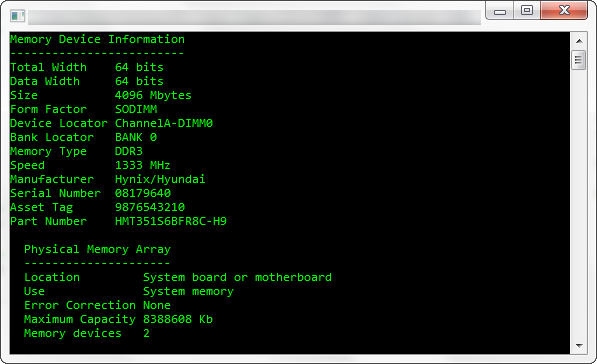 If you need to know what type of RAM is installed in your system or how is the manufacturer of your memory device, you can try reading the SPD (Serial presence detect) info directly (but not all the memory devices exposes the SPD info and reading the SPD require Kernel Mode access) , use the Win32_PhysicalMemory WMI class (but depending of the manufacturer the WMI fails to get info about some memory properties like the memory type) or using the SMBIOS.
If you need to know what type of RAM is installed in your system or how is the manufacturer of your memory device, you can try reading the SPD (Serial presence detect) info directly (but not all the memory devices exposes the SPD info and reading the SPD require Kernel Mode access) , use the Win32_PhysicalMemory WMI class (but depending of the manufacturer the WMI fails to get info about some memory properties like the memory type) or using the SMBIOS.
Using the SMBIOS you can get most of the info related to the memory devices installed like manufacturer, type, speed, serial number and so on. The next snippet show how using the TSMBIOS and Delphi (or FPC) you can retrieve such data.
{$IFDEF FPC}{$mode objfpc}{$H+}
{$ELSE}
{$APPTYPE CONSOLE}
{$ENDIF}
uses
Classes,
SysUtils,
uSMBIOS;
procedure GetMemoryDeviceInfo;
Var
SMBios : TSMBios;
LMemoryDevice : TMemoryDeviceInformation;
begin
SMBios:=TSMBios.Create;
try
WriteLn('Memory Device Information');
WriteLn('-------------------------');
if SMBios.HasMemoryDeviceInfo then
for LMemoryDevice in SMBios.MemoryDeviceInformation do
begin
WriteLn(Format('Total Width %d bits',[LMemoryDevice.RAWMemoryDeviceInfo^.TotalWidth]));
WriteLn(Format('Data Width %d bits',[LMemoryDevice.RAWMemoryDeviceInfo^.DataWidth]));
WriteLn(Format('Size %d Mbytes',[LMemoryDevice.GetSize]));
WriteLn(Format('Form Factor %s',[LMemoryDevice.GetFormFactor]));
WriteLn(Format('Device Locator %s',[LMemoryDevice.GetDeviceLocatorStr]));
WriteLn(Format('Bank Locator %s',[LMemoryDevice.GetBankLocatorStr]));
WriteLn(Format('Memory Type %s',[LMemoryDevice.GetMemoryTypeStr]));
WriteLn(Format('Speed %d MHz',[LMemoryDevice.RAWMemoryDeviceInfo^.Speed]));
WriteLn(Format('Manufacturer %s',[LMemoryDevice.ManufacturerStr]));
WriteLn(Format('Serial Number %s',[LMemoryDevice.SerialNumberStr]));
WriteLn(Format('Asset Tag %s',[LMemoryDevice.AssetTagStr]));
WriteLn(Format('Part Number %s',[LMemoryDevice.PartNumberStr]));
WriteLn;
if LMemoryDevice.RAWMemoryDeviceInfo^.PhysicalMemoryArrayHandle>0 then
begin
WriteLn(' Physical Memory Array');
WriteLn(' ---------------------');
WriteLn(' Location '+LMemoryDevice.PhysicalMemoryArray.GetLocationStr);
WriteLn(' Use '+LMemoryDevice.PhysicalMemoryArray.GetUseStr);
WriteLn(' Error Correction '+LMemoryDevice.PhysicalMemoryArray.GetErrorCorrectionStr);
if LMemoryDevice.PhysicalMemoryArray.RAWPhysicalMemoryArrayInformation^.MaximumCapacity<>$80000000 then
WriteLn(Format(' Maximum Capacity %d Kb',[LMemoryDevice.PhysicalMemoryArray.RAWPhysicalMemoryArrayInformation^.MaximumCapacity]))
else
WriteLn(Format(' Maximum Capacity %d bytes',[LMemoryDevice.PhysicalMemoryArray.RAWPhysicalMemoryArrayInformation^.ExtendedMaximumCapacity]));
WriteLn(Format(' Memory devices %d',[LMemoryDevice.PhysicalMemoryArray.RAWPhysicalMemoryArrayInformation^.NumberofMemoryDevices]));
end;
WriteLn;
end
else
Writeln('No Memory Device Info was found');
finally
SMBios.Free;
end;
end;
begin
try
GetMemoryDeviceInfo;
except
on E:Exception do
Writeln(E.Classname, ':', E.Message);
end;
Writeln('Press Enter to exit');
Readln;
end.
Note: Remember if you uses FPC, you can use this library in linux as well :)

